Discrepancy = Underachievement
Words to know for chapter 3:
Discrepancy - a difference between two things
Ability - what you are able to do
Achievement - what you have already done
Underachievement - not working up to your ability
Basic Reading - sounding out words
Reading Comprehension - understanding what you have read
Math Calculation - solving basic number problems
Math Reasoning - solving story problems or real-life math situations
Written Expression - giving information in writing
Oral Expression - giving information by talking
Listening Comprehension - understanding what you hear
 'According
to the definition, a learning disability causes a 'discrepancy'
between ability and achievement. In fact, this 'discrepancy' is the
first sign of your learning disability that parents or teachers will
notice. But what is a discrepancy?'
'According
to the definition, a learning disability causes a 'discrepancy'
between ability and achievement. In fact, this 'discrepancy' is the
first sign of your learning disability that parents or teachers will
notice. But what is a discrepancy?'
When talking about learning disabilities, discrepancy means the same thing as underachievement. You simply are not able to 'achieve' as well as you should in school. Maybe you are smart enough to get A's but can only earn C's or D's, no matter how hard you work. You're not dumb, you just have trouble learning. That is a discrepancy.
It is like a very fast sports car that gets bogged down in heavy traffic or road construction. Even though the car has the 'ability' to go very fast, it can't 'achieve' a very high speed.

With a learning disability, it is information that gets bogged down while traveling through your brain.
Most (in fact, almost all) students are able to achieve at or very close to their ability level as shown in the chart below:
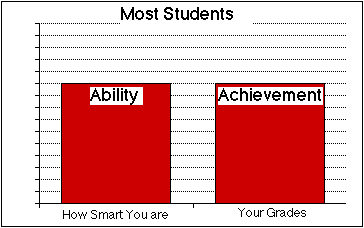
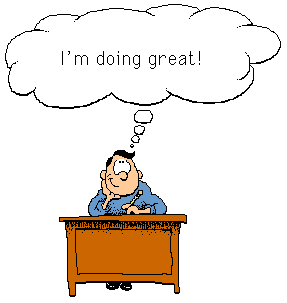
But LD students aren't able to show how smart they are:
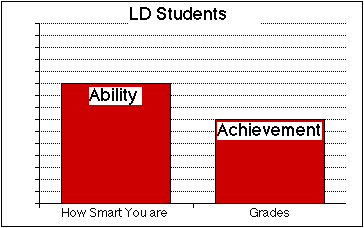
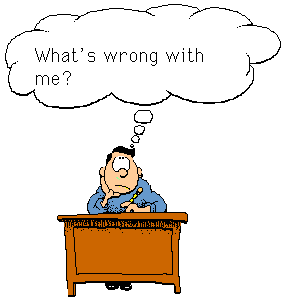
The first sign of this discrepancy is underachievement in the classroom. Your parents or teachers might say that you aren't doing as well as they think you should.
They may say things like:
'you're lazy'
'you're not motivated' or
or
'you're not trying'
But what they are really saying is that they know you are smarter than you may appear in school.
After your 'underachievement' has been noticed, testing is done by special education teachers and school psychologists to measure your 'discrepancy' and see how serious your learning difficulties really are.
To have a learning disability you must have a 'severe discrepancy' in at least one of the following areas:
Basic Reading
Reading Comprehension
Math Calculation
Math Reasoning
Written Expression
Oral Expression
Listening Comprehension
'So it seems that discrepancy just means that there is a pretty big difference between your ability to learn and how well you are actually learning in certain subjects at school.'
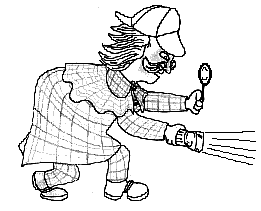
'Now, on with the
case......................'
Underachievement Worksheet
Place an X along the arrow to indicate where you think your skills are in each area.
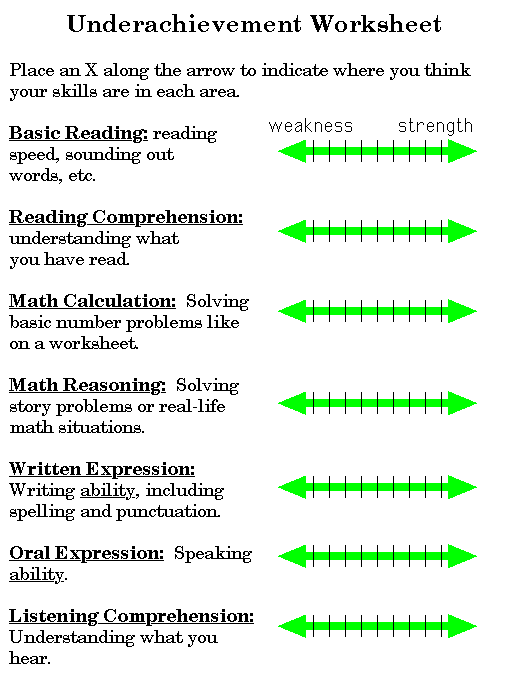
Return to the LDinfo Web Site to find out about any of the following topics (and more):
Learning disabilities - what is a learning disability (LD or SLD)?
Dyslexia: Dyslexia is a reading disability or reading disorder
Dysgraphia Dysgraphia is a writing disability or disorder
Dyscalculia Dyscalculia is a math disability or disorder
What is an attention deficit disorder (ADD, AD/HD, ADHD)?
Gifted LD: Can a student be gifted and LD?
Emotional/Behavioral issues and LD: Do LD students experience behavior problems or depression?
Section 504: What is a Section 504 plan?
What is special education?
What is processing?
What is a severe discrepancy?
What is a nonverbal learning disability (nonverbal LD or NLD)?
What is a central auditory processing disorder (CAPD)?
Uncovering the Mysteries of your Learning Disability
Order printed copies of this manual
- Chapter 1 - What is a Learning Disability?
- Chapter 2 - What Causes Learning Disabilities?
- Chapter 3 - Discrepancy = Underachievement
- Chapter 4 - Processing: The Sensory Channels
- Chapter 5 - Processing: The Cognitive Channels
- Chapter 6 - Processing: Sensory + Cognitive
- Chapter 7 - LD Jargon
- Chapter 8 - Using Accommodations
- Chapter 9 - Other Issues Related to LD
- Chapter 10 - Intelligence vs IQ
- Chapter 11 - Exercizing Your Weakness
- Chapter 12 - LD and the Law
- Chapter 13 - Becomming an Effective Self-Advocate
- Chapter 14 - Planning for Your Future
- Chapter 15 - The Summary
Copyright © 2006-2017 LDinfo Publishing
All rights reserved. Any reuse or republishing of the text
or images on this web site without prior written consent of
the copyright holder is prohibited.